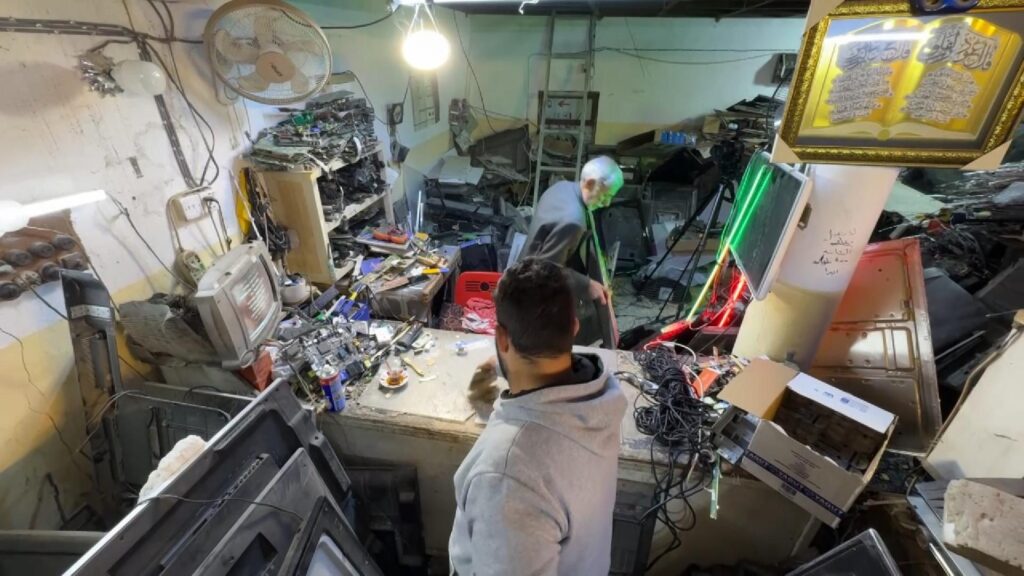Iraqi Prime Minister Slams Holding Hashed Al-Shaabi Military Parade in Baghdad

The Popular Mobilisation Forces (PMF), or Hashed Al-Shaabi, have been trying unsuccessfully for two weeks to organise an official military parade in Baghdad on the anniversary of the PMF’s creation, amid deepening differences between its commander, Abdul Aziz Al-Muhammadawi (Abu Fadak) and Iraqi Prime Minister Mustafa Al-Kadhimi.
Kadhimi, Commander-in-Chief of the Armed Forces of Iraq, according to the constitution, refused to allow the parade to proceed on June 13, the PMF’s founding anniversary. Meanwhile, sources in the PMF said that the parade had been postponed to the end of this month to allow for broader participation.
Kadhimi believes that a new display of PMF weaponry in Baghdad, under any pretext, will represent more Iranian defiance of the Iraqi state. But informed sources described the prime minister as coming under enormous political pressure to change his mind.
There is dispute on agree between the leaders of PMF where will do the parade PMF and the most probably they agree do the parade in camp of Mujahideen-Al Khalq located in Diyala.
— khalo atheer (@atheer_mtc) June 15, 2021
The parade will done in, 20 May,2021 pic.twitter.com/nAsw42Xlnv
According to these sources, Iran is pressuring Kadhimi, through politicians and military officers, to withdraw his objections to the holding of the military parade. They also confirm the existence of unprecedented tensions between Kadhimi and Abu Fadak.
The sources added that the leaders of the Shia militias affiliated with Iran have suggested Saturday June 26 as an initial alternative date for the PMF march in Baghdad, but have not so far obtained the government’s approval.
The Marjaiya Brigade, which is close to Shia cleric Ali al-Sistani, has announced that it will not participate in a PMF military display at the end of the month.
The brigade said it was refusing for the same reasons that had caused it to split from the PMF. These relate to questions about the independence of the Popular Mobilisation Forces and their obedience to Iraqi laws and orders from the Commander-In-Chief of the Armed Forces.
The showdown between the PMF and the Kadhimi government highlights the extent of the challenges facing Iraq as it strives to organise early elections next October.
Observers say that the PMF has political motives behind the parade as it seeks through it to bolster popular support for the Al-Fateh List, which will compete during the upcoming elections.
Iran is said to have renewed its endorsement of Hadi Al-Amiri, the leader of the Badr Organisation, to lead the Al-Fateh List, which brings together Shia militias competing in the forthcoming general elections.
Iraqi political analyst Saleh al-Hamdani told The Arab Weekly that the PMF and its leadership constitute a strong centre of power that cannot be underestimated. They are formally under the authority of the Commander-in-Chief of the Armed Forces, but they do not seem persuaded that Kadhimi is their leader, as demonstrated by the threatening military display they put on when PMF regional commander, Qassem Musleh, was arrested before being subsequently released.
Independent Iraqi politician, Jabbar al-Mashhadani, has dismissed the idea that Kadhimi could win a new confrontation with the pro-Iran armed factions, especially after the momentum they gained following the election of hard-line Iranian president, Ebrahim Raisi.
Mashhadani told The Arab Weekly that Kadhimi lost two previous challenges. The first, was around the case of the so-called Dora cell, when a group of arrested PMF members was released after a quick and violent intervention by their comrades who stormed the gates of the Green Zone. The second was the case of Qassem Musleh, who was also eventually set free.
When the Islamic State (ISIS) extremist group swept across large parts of the country in 2014, influential Shia cleric Ali al-Sistani called on young Iraqis to take up arms to defend the country’s cities. His call led to the formation of a volunteer force numbering thousands.
But then-Prime Minister Nuri al-Maliki, with the help of Shia militias affiliated with Iran, took advantage of the turmoil during that period to establish new forces that rival the Iraqi army, along the lines of the Revolutionary Guard, which competes with the Iranian army and even leads and controls it in Iran.
But after the abuses involving PMF militias against unarmed civilians, corrupt deals in state ministries and the challenge by the PMF to the authority of the state, there were calls on Sistani to issue a fatwa dissolving the Popular Mobilisation Forces as, with the defeat of ISIS in Mosul, they were no longer needed.
Sistani’s office responded by saying that “ It did not issue a fatwa to establish the Hashed so it will not issue one to dissolve it.”
The Hashed/PMF issue is a serious problem for the Iraqi state. The force is formally under the authority of the Commander-in-Chief of the Armed Forces, Khadimi and receives the necessary funding and training from the Iraqi government. But the orders to which it responds come it publicly from Iran.
When an Iraqi security force arrested, Qassem Musleh, on charges of killing activists and striking Iraqi army camps with missiles, on May 26, thousands of PMF members surrounded the Iraqi government headquarters in the Green Zone in central Baghdad, demanding his release.
This siege constituted a public military display of armed force against the government and its official institutions by formations that are supposed to be under the authority of the state. This prompted many commentators to describe the incident as an Iranian coup against the political process in the country.
On that occasion, the militias’ parade, where heavy and medium weapons and personnel carriers were displayed, represented a stark challenge for the Iraqi government, which found itself in a tough spot. It had to choose between a bloody confrontation and a quiet solution. It was forced to pick the second and less costly option.
This article has been adapted from its original source.

